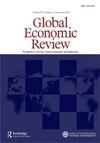Effect of Participation of Foreign Migrant Workers in Labour Market on Native Workers: Evidence Based on Change Noticed in College Premium in Taiwan ROC
IF 2.6
4区 经济学
Q2 ECONOMICS
引用次数: 2
Abstract
ABSTRACT Using Manpower Utilization Survey data for 14 years from 1999 to 2012, we applied the DDDD (Differences–in–differences–in–differences–in–differences) estimation method to check if rising presence of foreign migrant workers in Taiwan’s domestic labour market had any impact on employment opportunities and wages earned by native Taiwanese workers over time. We used the data capturing the effect of college premium (viz., the additional cost to be borne for getting admission into college) paid by the natives on domestic wage rate during this period. College premium is an indicator of demand and supply for educated labour and we intend to see if the premium has grown with time when influx of foreign migrant workers has grown too. From the results, two interesting phenomena caught our attention. First, labour policy adopted by the Government in Taiwan has played an important role in increasing the influx of foreign workers into domestic labour market, which resulted in significant change in college premium paid by the natives. And, this effect lasted even when instances of strikes and reported cases of labour disputes were relatively higher. Second, the effect of the policy has been varying across genders as our data shows that policy on employment of foreign workers has affected job opportunities of native men workers more than it affected job opportunities of their female counterpart.外劳参与劳动市场对本地劳工的影响:基于台湾大学溢价变动的证据
摘要本研究以1999年至2012年的14年人力资源利用调查数据,运用DDDD (difference - in - difference - in - difference - in - difference - in - difference - in - difference - in - difference)估计方法,检视外劳在台湾劳动市场的增加,是否随著时间的推移,对台湾本地劳工的就业机会与薪资有影响。我们使用的数据捕捉了在此期间本地人支付的大学溢价(即为进入大学而承担的额外成本)对国内工资率的影响。大学溢价是对受过教育的劳动力的需求和供应的一个指标,我们想看看溢价是否随着时间的推移而增长,而外国移民工人的涌入也在增加。从结果来看,两个有趣的现象引起了我们的注意。首先,台湾政府采取的劳工政策在增加外国工人涌入国内劳动力市场方面发挥了重要作用,导致当地人支付的大学保险费发生了重大变化。而且,这种影响即使在罢工事件和报告的劳资纠纷案件相对较高的情况下也会持续存在。其次,该政策的影响因性别而异,因为我们的数据显示,外国工人就业政策对本地男性工人就业机会的影响大于对女性工人就业机会的影响。
本文章由计算机程序翻译,如有差异,请以英文原文为准。
求助全文
约1分钟内获得全文
求助全文

 求助内容:
求助内容: 应助结果提醒方式:
应助结果提醒方式:


